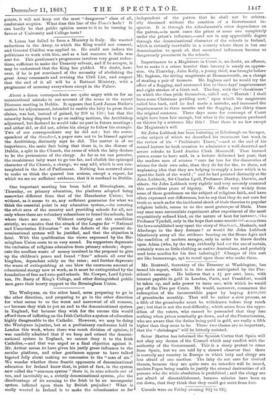The Wesleyans, on the other hand, seem preparing to go
in the other direction, and preparing to go in the other direction for what seems to us the worst and narrowest of all reasons, not because they wish to put an end to the denominational system in England, but because they wish for the excuse this would afford them of inflicting on the Irish Catholics a system of education highly disagreeable to the Catholic. However, we may be doing the Wesleyans injustice, but at a preliminary conference held in London this week, where there was much division of opinion, it was candidly admitted that if we keep and extend the denomi- national system in England, we cannot deny it to the Irish Catholics,—and that was urged as a final objection against it. Mr. Arthur seems to have given his justly great influence to the secular platform, and other gentlemen appear to have talked bigoted folly about making no concession to the "man of sin." We wonder whether these frantic opponents of denominational education for Ireland know that, in point of fact, in the system now called the "common system "there is, in nine schools out of ten, and inevitably so, a strictly denominational system, plus the disadvantage of its seeming to the Irish to be an uncongenial system inflicted upon them by British prejudice? What is really wanted in Ireland is to make the schoolmaster so far independent of the patron that he shall not be arbitra- rily dismissed without the sanction of a Government in- spector. It is through the schoolmaster's utter dependence on the patron,—in most cases the priest or some one completely under the priest's influence,—and not in any appreciable degree through the denominational character of the schools in Ireland, which is virtually inevitable in a country where there is but one denomination to speak of, that sacerdotal influences become so dangerously prominent in the schools.






































 Previous page
Previous page